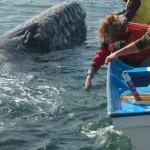In an unprecedented attack on one of the Sea Shepherd vessels monitoring their illegal whaling activities in the Southern Ocean the Japanese whale catcher boat Shonan Maru No 2 rammed the much smaller Ady Gil causing extensive damage to the vessel and seriously endangering the crew.
This reckless endangerment of life on the high seas by the Japanese whaling vessel Shonan Maru should attract nothing short of international condemnation and censorship and international communities should demand an apology, reparations to repair/replace the seriously damaged craft and the captain and crew of the Japanese vessel responsible for the ramming should face criminal charges.
To watch the video of this blatant act click here
ENDS
